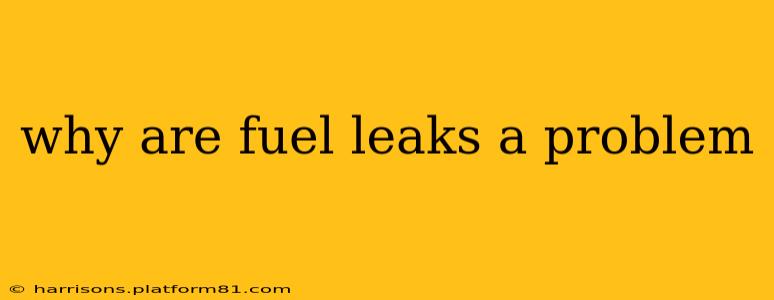Fuel leaks pose a significant threat, impacting safety, the environment, and your wallet. Understanding the dangers and preventative measures is crucial for responsible vehicle ownership. This comprehensive guide explores the various reasons why fuel leaks are such a serious problem.
What are the Dangers of Fuel Leaks?
The primary concern with fuel leaks is the high flammability of gasoline and other fuels. Even a small leak can create a volatile situation, especially near ignition sources like a hot engine or electrical components. This risk translates to:
- Fire Hazards: Fuel spills can easily ignite, leading to devastating fires that can severely damage property and cause serious injury or even death.
- Explosion Risks: A buildup of fuel vapors in an enclosed space can create an explosive mixture, posing a significant danger.
- Health Risks: Inhaling fuel fumes can cause dizziness, headaches, nausea, and other health problems, both short-term and long-term. Direct skin contact can also lead to irritation and other health issues.
- Environmental Damage: Fuel leaks contaminate soil and water sources, harming wildlife and ecosystems. This environmental damage can be costly to remediate.
What Causes Fuel Leaks?
Understanding the root causes of fuel leaks is key to prevention. Several factors contribute:
- Damaged Fuel Lines: Age, wear and tear, corrosion, or physical damage to fuel lines are common causes of leaks. Cracks, holes, and loose connections can all lead to fuel spillage.
- Faulty Fuel Pump: A malfunctioning fuel pump can cause pressure fluctuations, leading to leaks at various points in the fuel system.
- Worn Fuel Injectors: Damaged or worn fuel injectors can leak fuel into the engine or onto the surrounding components.
- Loose or Damaged Fuel Tank: A compromised fuel tank, whether due to rust, collision damage, or improper installation, is a major source of leaks.
- Improper Maintenance: Neglecting regular vehicle maintenance increases the likelihood of fuel leaks developing.
How Can I Tell if I Have a Fuel Leak?
Recognizing the signs of a fuel leak is crucial for preventing accidents. Be vigilant and look out for:
- Fuel Odor: A strong smell of gasoline is a clear indication of a potential leak.
- Visible Fuel: Observe your vehicle for any visible fuel dripping or pooling under or around the fuel system components.
- Fuel Gauge Discrepancies: If your fuel gauge drops unexpectedly, it might indicate a leak.
- Rough Engine Running: A fuel leak can disrupt the engine's fuel supply, leading to rough running or stalling.
What Should I Do If I Suspect a Fuel Leak?
If you suspect a fuel leak, do not attempt to diagnose or repair it yourself. Fuel leaks are dangerous and require professional attention. Here's what you should do:
- Turn off the engine immediately.
- Do not smoke or operate any electrical devices near your vehicle.
- Ventilate the area to disperse fuel vapors.
- Contact a qualified mechanic or towing service.
How Much Does Fuel Leak Repair Cost?
The cost of fuel leak repair varies greatly depending on the severity of the damage and the location of the leak. Minor repairs might cost a few hundred dollars, while major repairs requiring fuel tank replacement can cost thousands. Regular maintenance can significantly reduce the likelihood of expensive repairs.
How Can I Prevent Fuel Leaks?
Preventative maintenance is your best defense against fuel leaks:
- Regular Inspections: Visually inspect your fuel lines, tank, and other components during regular maintenance checks.
- Professional Maintenance: Schedule regular professional maintenance to catch potential problems early.
- Avoid Driving on Rough Terrain: Excessive bumps and jarring can damage fuel lines and other components.
Fuel leaks are a serious safety and environmental hazard. By understanding the risks, recognizing the signs, and practicing preventative maintenance, you can protect yourself, your vehicle, and the environment. Remember, professional help is crucial if you suspect a fuel leak. Don't take chances; safety should always be your top priority.
